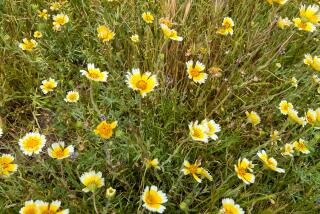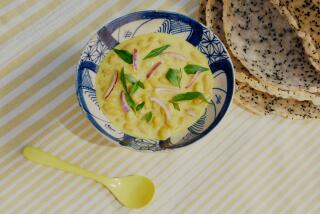Market Watch: Frog Hollow’s rock star apricot farmer
— It’s always an event when “Farmer Al” Courchesne of Frog Hollow Farm shows up at the Santa Monica farmers market, where he’ll be selling apricots and cherries for the next month. He’s a celebrity farmer in the Bay Area, folksy yet sophisticated, and his fruit often matches his charisma.
Frog Hollow is in Brentwood, 40 miles east of San Francisco in Contra Costa County, one of California’s best districts for growing stone fruit, warm during the day but cooled by sea breezes at night, so the fruit stays on the tree long enough to develop full color and flavor. Courchesne has been certified organic since 1989. And he sells several excellent and unusual varieties of apricots, which are an improvement over the mealy, tasteless or tart varieties such as Earlicot, Poppycot and Castlebrite that disgrace the month of May. By contrast, a properly ripe apricot of a good variety should offer succulent flesh, a balance of sweetness and acidity, and a musky, honeyed aroma.
Courchesne, who grows 10 apricot varieties on 26 acres, started on Wednesday with Kettleman, a large, golden orangeU.S. Department of Agriculturevariety with a flavor hinting at citrus and melon. Next week he’ll have HoneyRich Apriums, much better than the sour, acrid TastyRich that’s been in markets the last few weeks.
But the real fireworks start June 6 with a rare opportunity to taste Orangered, one of the best modern apricot varieties, bred in New Jersey and a favorite in France; it’s firm and meaty but juicy, with rich flavor derived from an Afghan parent. It’s virtually unknown here because its winter chill requirement is much too high for California. Taste Orangered this year, because Courchesne, who now realizes he made a mistake planting the variety, is grafting over his trees to varieties that are more productive at his location. He’ll also have Robada, Orangered’s California daughter, which has many of the same good qualities and is one of the best locally adapted commercial varieties.
June 13, about the time that mediocre Pattersons are flooding the markets, Courchesne will offer Helena, a decent but not particularly flavorful variety, and his personal favorite, Goldensweet, which has golden skin and sweet flesh with classic apricot flavor.
June 20 he’ll have the matchless Blenheim, which he’s marketing for the first time, surprisingly, from a rented property that he’s farming. (Mike Cirone of San Luis Obispo, the Blenheim King, should also be showing up in Santa Monica that day, or perhaps the week before, and he’s got a huge, high-quality crop, he says.)
On June 20, assuming no climatic disruptions in the harvest schedule, Courchesne will also have a real treat, Cotton Candy white Apriums, which, like most white apricots, are way too soft for commercial sales but are very sweet and juicy, with a distinctive melon flavor. (Nicholas Family Farms of Orange Cove, which sells at many markets including Torrance, Larchmont and Studio City, will also have this extraordinary variety.)
Most special, Courchesne has 200 young trees of the celebrated Candycots, Central Asian varieties that are generally small but are 50% to 100% sweeter than traditional Western apricots, with balancing acidity and intense, lingering flavor. The trees won’t be bearing until next year, but at least we can dream of what it will be like to have our own farmers market source for these explosively flavorful fruits.
And for the next two weeks, Courchesne will have Bing and Rainier cherries, which get especially plump and sweet in his area. Brentwood is roughly equivalent in timing and perhaps a slight step up in quality from Stockton, 25 miles east, since it’s closer to the coast. Bing, dark and rich, is the standard of flavor for cherries and can be grown only up north or at higher elevations in Southern California. Courchesne is one of very few organic Bing growers, if not the only one, to make the long drive from upstate to sell personally at a local farmers market, which may make the high price for his cherries, $7 a pound, seem more reasonable. (His apricots are $4.90 a pound.)
Courchesne is best known for his peaches and nectarines, but since there are already plenty of these at the Santa Monica market, it seems most likely that he won’t be invited to sell them there, at least this year, he said. He’ll return in October with Warren pears and dried fruit.
From the consumer’s standpoint, it seems fair to ask whether we need Frog Hollow stone fruit grown 350 miles away at farmers markets. For apricots, the answer is yes, because of the superiority of the Brentwood growing area and because so few growers from the San Joaquin Valley do a good job choosing and marketing early-season varieties. For cherries, the answer is yes because Bings and Rainiers from the districts ringing the Bay Area are the best in California.
For peaches and nectarines, the answer is positive but less straightforward: Too many of the peaches and nectarines at local farmers markets are industrial varieties, harvested to supermarket standards, stored at refrigerated depots in the Southland and sold by employees who have nothing to do with the farm. By contrast, Frog Hollow’s fruit is artisanally grown and sold by the farmer, in person, so welcome on that account; but there are a fair number of high-quality growers available from south of Fresno (e.g. Tenerelli, Fitzgerald Kelly, Cirone and Windrose).
From his own standpoint, why is Courchesne, who turned 69 Sunday, driving six hours south to Santa Monica, when he could sell everything he grows locally? He explains that he enjoys visiting beloved relatives who live close to the market, that he’s looking to build his farm’s reputation with retailers and distributors in the Southland and that he simply loves the Santa Monica market scene. It’s another stage for a rock star farmer.
More to Read
Eat your way across L.A.
Get our weekly Tasting Notes newsletter for reviews, news and more.
You may occasionally receive promotional content from the Los Angeles Times.






